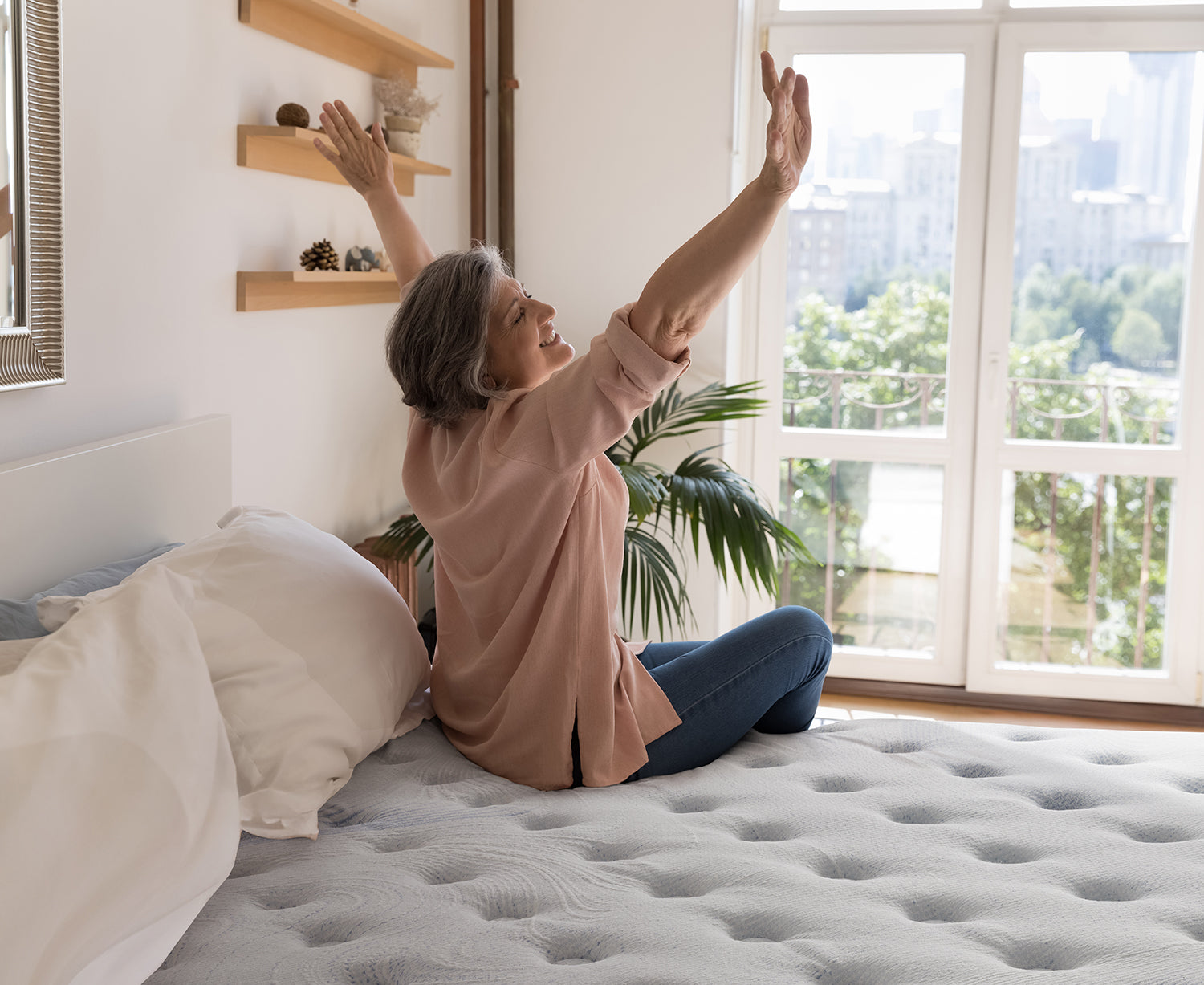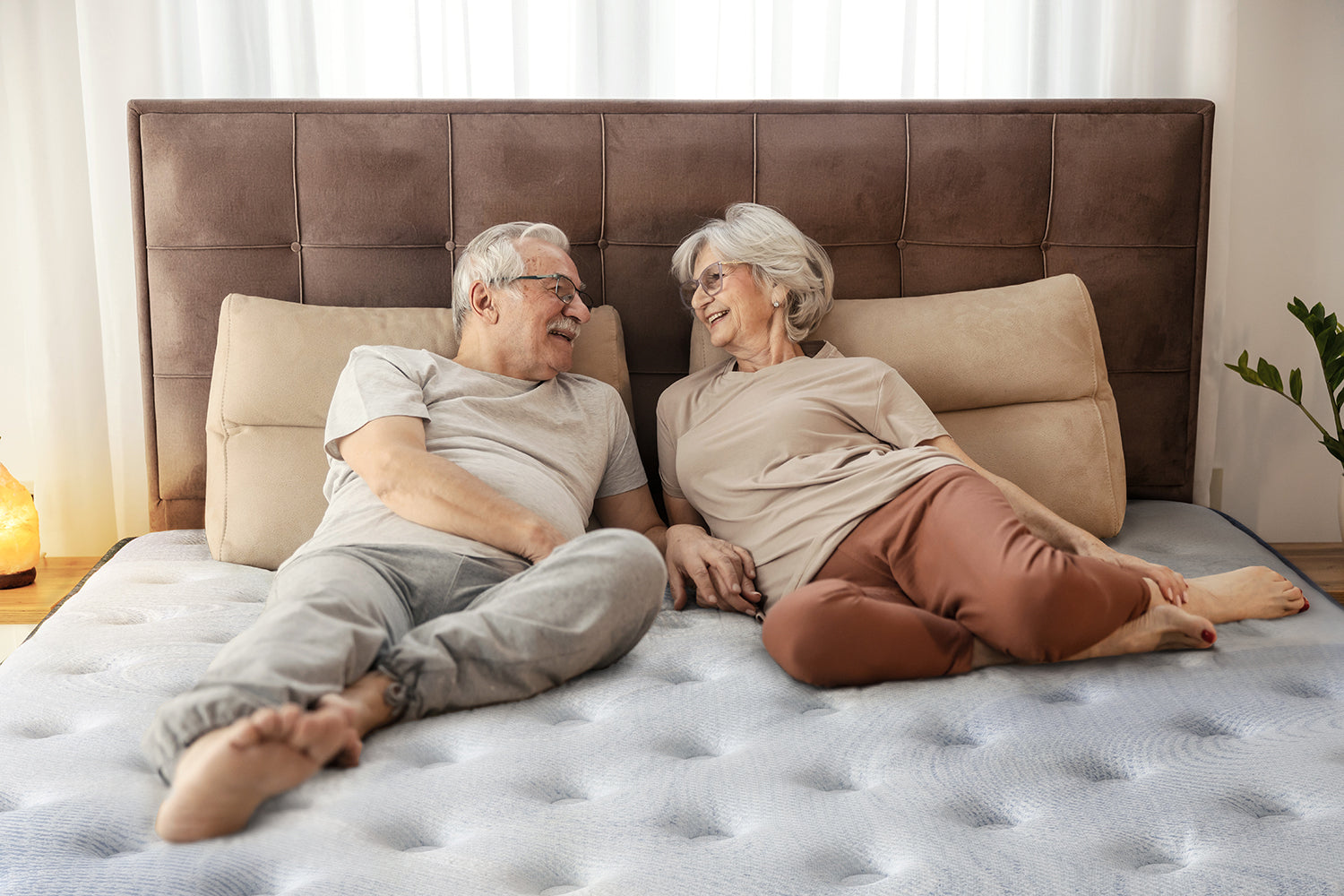Night sweats can be frustrating, disrupting your sleep and leaving you feeling uncomfortable and overheated in the middle of the night. Whether you’re waking up drenched in sweat or simply tossing and turning due to heat, night sweats can significantly affect your sleep quality. Understanding what causes night sweats and how you can take steps to sleep cooler is essential for improving your rest and overall well-being.
In this guide, we’ll explore the causes of night sweats and offer practical tips, including the benefits of cooling mattresses, to help you sleep cooler and enjoy a better night’s sleep.
What Are Night Sweats?
Night sweats refer to excessive sweating during sleep that results in drenched bedclothes or sheets. While it's normal to sweat during sleep as the body regulates temperature, night sweats are more intense and can happen even in a cool environment. They often leave you feeling overheated and uncomfortable, waking up multiple times throughout the night.
Night sweats are distinct from hot flashes, though they can occur simultaneously, particularly during menopause. Hot flashes are sudden feelings of intense heat that can cause sweating, while night sweats are prolonged sweating episodes that happen while you sleep.
What Causes Night Sweats?
There are several potential causes for night sweats. They can range from environmental factors to underlying medical conditions. Understanding these causes is the first step in addressing the issue.
1. Hormonal Changes
-
Menopause: One of the most common causes of night sweats is menopause, where hormonal fluctuations, particularly a drop in estrogen, cause hot flashes and excessive sweating. This is especially common in women between the ages of 45 and 55.
-
Pregnancy: Hormonal shifts during pregnancy, particularly in the early stages, can lead to increased body temperature and night sweats.
-
Andropause: For men, andropause (the male equivalent of menopause) can also result in night sweats due to hormonal changes, particularly a decline in testosterone levels.
2. Medical Conditions
-
Infections: Certain infections, such as tuberculosis, HIV/AIDS, and endocarditis, can cause night sweats as part of the body's response to illness.
-
Sleep Apnea: Individuals with sleep apnea may experience night sweats due to breathing interruptions and changes in oxygen levels during sleep.
-
Hyperthyroidism: An overactive thyroid can cause the body to produce too much heat, leading to night sweats.
-
Cancer: Some cancers, such as lymphoma and leukemia, are associated with night sweats, particularly in the later stages of the disease.
3. Medications
-
Antidepressants: Some medications, particularly certain antidepressants, have night sweats as a side effect. This includes medications like selective serotonin reuptake inhibitors (SSRIs).
-
Steroids: Certain corticosteroids, when used long-term, can also lead to night sweats.
-
Hormonal Therapy: Medications that affect hormonal balance, such as those used in hormone replacement therapy (HRT) or treatments for prostate cancer, can trigger night sweats.
4. Environmental Factors
-
Warm Sleep Environment: A sleep environment that’s too warm, with thick blankets or a high room temperature, can lead to night sweats. The body naturally tries to cool down, resulting in excessive perspiration.
-
Heavy Bedding: Using thick blankets or comforters can contribute to overheating during the night, triggering sweat.
5. Lifestyle Factors
-
Alcohol: Drinking alcohol before bed can raise body temperature and increase sweating during sleep.
-
Spicy Foods: Eating spicy or hot foods close to bedtime can also trigger sweating due to the body’s natural response to capsaicin (the compound in chili peppers).
-
Stress and Anxiety: High stress levels can cause increased sweating, particularly during sleep, as the body tries to deal with the stress response.
How to Sleep Cooler and Reduce Night Sweats
If you suffer from night sweats, there are several practical steps you can take to sleep cooler and improve your sleep quality. From adjusting your sleep environment to investing in a cooling mattress, here are some strategies to help you sleep more comfortably.
1. Optimize Your Sleep Environment
-
Cool Your Room: Keep your bedroom at a comfortable temperature. Ideally, aim for a room temperature between 60°F and 67°F (15.6°C and 19.4°C). Use a fan, air conditioner, or open windows to improve airflow and cool the space.
-
Bedding Choices: Choose lightweight, breathable bedding materials. Cotton sheets and blankets are great for keeping cool, while heavier blankets and comforters trap heat.
-
Use Moisture-Wicking Pajamas: Wearing moisture-wicking sleepwear made of natural fabrics like cotton or linen helps keep sweat away from your skin and reduces the feeling of being damp during the night.
2. Consider a Cooling Mattress
-
Cooling Gel Memory Foam: Memory foam mattresses infused with cooling gel help regulate temperature by drawing heat away from the body. These mattresses allow for better airflow and reduce the risk of overheating.
-
Breathable Materials: Choose a mattress made with breathable materials, such as latex or hybrid mattresses with a combination of memory foam and pocketed coils. These materials enhance airflow and help maintain a cooler sleeping surface.
-
Phase Change Materials (PCMs): Some cooling mattresses incorporate phase change materials that absorb and release heat as needed. These materials adjust to your body’s temperature to help regulate warmth and ensure a comfortable sleep.
3. Adjust Your Sleep Routine
-
Shower Before Bed: A lukewarm shower before bed can help cool your body down and prepare it for sleep. Avoid hot showers, as they can raise your body temperature.
-
Stay Hydrated: Dehydration can make night sweats worse. Be sure to drink plenty of water throughout the day, but avoid drinking large amounts of water just before bed.
-
Avoid Alcohol and Spicy Foods: Alcohol and spicy foods can elevate your body temperature and trigger sweating. Try to avoid consuming these close to bedtime.
4. Manage Stress and Anxiety
-
Relaxation Techniques: Practicing relaxation techniques like deep breathing, yoga, or meditation before bed can help reduce stress and anxiety, which are common triggers for night sweats.
-
Cognitive Behavioral Therapy (CBT): If stress or anxiety is a significant trigger, consider seeking help from a professional who can guide you through relaxation strategies and cognitive techniques to manage these factors.
Conclusion
Night sweats can be uncomfortable and disruptive to your sleep, but understanding their causes and implementing strategies to sleep cooler can help you manage the issue. Whether night sweats are caused by hormonal changes, medications, environmental factors, or lifestyle habits, making adjustments to your sleep environment can help improve your sleep quality.
At BedStory, we offer cooling mattresses designed to regulate temperature and keep you comfortable throughout the night. With advanced features like cooling gel memory foam and breathable designs, our mattresses are designed to help you sleep cooler and wake up feeling refreshed.
If you’re tired of waking up overheated and drenched in sweat, it may be time to make a change. Try a cooling mattress from BedStory and experience a more comfortable, cooler night’s sleep.



Leave a comment
This site is protected by hCaptcha and the hCaptcha Privacy Policy and Terms of Service apply.